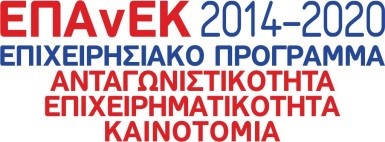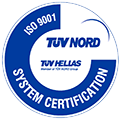1. PRODUCING NATIONAL STATISTICS ON RESEARCH & INNOVATION
In line with the country’s obligations to the European Union (European Parliament and Council Decision no 1608/2003/EC), the GSRI is responsible for producing and monitoring Greek national statistics on science, technological development and innovation. In April 2012, the GSRI decided (Government Gazette issue no 1359/Β/25.04.2012) to entrust the National Documentation Center (E.K.T.) with collecting, processing and presenting the official statistics for Research, Technological Development & Innovation in Greece, as well as with compiling and submitting relevant reports to Eurostat as required. Since then, the National Documentation Center provides official statistic information and public policies monitoring, having established itself as the national authority for European research, development and innovation statistics under the Hellenic Statistical System, in close collaboration with the Hellenic Statistical Authority (ELSTAT), Eurostat and the OCDE.
It must be noted that Ε.Κ.Τ. was selected by the GSRI for this task on account of its long-standing experience in collecting, processing and providing documentation material on Research and Technology as well as in light of its close collaboration with the GSRI in order to achieve scientifically sound and indisputable results.
Modalities for the above statistics are set by Commission implementing regulations. Commission implementing regulation no 1608/2012 lays down the rules for producing science and research statistics in the following areas:
- Research & Development (R&D) statistics
- Statistics on government budget appropriations or outlays on research and development (GBAORD)
- Statistics on Innovation
- Statistics on human resources in science and technology, including gender mobility statistics, statistics on patents, statistics on high-technology industries and knowledge-based services, as well as other statistical data on science and technology.
Member States including Greece are thus required to produce and submit to Eurostat, the statistical office of the European Union, standard quality reports comprising data on:
Research and Development / Expenditure on and staff employed in research and development activities: separate reports are produced on R&D activities across the economy for the business sector, the government sector, the higher (post-secondary) education sector and, under certain conditions, the private non-profit sector.
More specifically:
- Regarding R&D expenditure, data shall cover in-house expenditure on R&D both at country level and for each of the four (4) abovementioned sectors, broken down by source of financing, type of R&D, type of expenditure, main scientific field, Region, economic activity, employment (for enterprises only);
- Regarding R&D staff, data shall cover R&D staff both at country level and for each of the four (4) abovementioned sectors, broken down by type of employment (researchers, technical personnel, other support staff), gender, level of education, main scientific field, economic activity, Region, number of employees (for enterprises only);
- Regarding government budget appropriations on R&D (GBΑORD indicator), data shall cover R&D in all sectors funded through State resources (ordinary budget, Public Investment Program, subsidiary budgets) broken down according to NABS thematic objectives for all types of entities (public bodies, business enterprises, private non-profit organizations). Funding can either involve individual projects or be of a permanent (legislated) nature;
Innovation activities in the business sector (Community Innovation Survey-CIS): the data produced cover innovative activities carried out by the business sector involving product (goods or services) and process (PP) innovations as well as marketing and organizational (MO) innovations. They are divided in 4 categories: products, processes, marketing and organization. Furthermore, statistical data on innovation at large, as well as by type of expenditure, are collected for the following activities:
- Intra-corporate (in-house) R&D
- External R&D
- Purchase of machinery, equipment, software and buildings
- External knowledge acquisition from other enterprises or organizations
- Other activities, such as training, introducing market innovations, etc.
2. OFFICIAL QUALITY REPORTS FOR SCIENCE AND TECHNOLOGY STATISTICS (INDICATORS)
The collection and processing of statistical data completed by E.K.T., available at http://metrics.ekt.gr/publications/483, comprises final data on the key expenditure and personnel indicators on Research & Development in Greece for 2019. The above final data have already been submitted to Eurostat.
Based on these, the following Diagram 1 presents the evolution of R&D expenditure in absolute values and as a percentage of GDP for the past decade. There is a clear upward trend with the GDP percentage reaching 1.27% in 2019 (almost doubling in a period of only nine years marked by a severe economic crisis).
Diagram 2 presents in absolute values the evolution of R&D expenditure over time in the four sectors under examination (business sector – higher education sector – government sector – private non-profit institutions sector). Data reveal an impressive increase of R&D expenditure in the business sector during the reference period (with said expenditure more than doubling).
It is noted that Greece has set the objective of increasing national R&D expenditure to 1.81% of GDP by 2030.
More posted files and information on the above reports, as well as additional statistics, time series and reports are available on the E.K.T. website, at www.metrics.ekt.gr/, under heading “OUR STATISTICS/Research & Development”.
Furthermore, R&D statistics for Greece, as well as other Member State comparative data, are available on the EUROSTAT database/website:
ec.europa.eu/eurostat/web/science-technology-innovation/data
Competent GSRI department:
- Department for Impact Asessment and Evaluation (Responsible: Dr. Nikolaos Sargianos, Head Officer)
Research and Innovation Policy Planning and Programming Directorate (Head Officer: Dr Agni Spilioti)

















